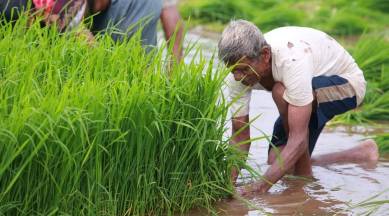Harikishan Sharma, Senior Assistant Editor at The Indian Express' National Bureau, specializes in reporting on governance, policy, and data. He covers the Prime Minister’s Office and pivotal central ministries, such as the Ministry of Agriculture & Farmers’ Welfare, Ministry of Cooperation, Ministry of Consumer Affairs, Food and Public Distribution, Ministry of Rural Development, and Ministry of Jal Shakti. His work primarily revolves around reporting and policy analysis. In addition to this, he authors a weekly column titled "STATE-ISTICALLY SPEAKING," which is prominently featured on The Indian Express website. In this column, he immerses readers in narratives deeply rooted in socio-economic, political, and electoral data, providing insightful perspectives on these critical aspects of governance and society. ... Read More
Cabinet announces hike in MSP for kharif crops in 5% to 10% range
While the MSP for paddy (common) has been fixed at Rs 2,183 per quintal, 7% higher than the last season, the MSP for moong has been fixed at Rs 8,558 per quintal, an increase of Rs 803.

The Centre on Wednesday announced a 5.3% to 10.35% hike in minimum support prices (MSP) of all mandated Kharif crops for marketing season 2023-24, with moong seeing the highest increase and urad the lowest.
A decision of this effect was taken by the Cabinet Committee on Economic Affairs (CCEA); the meeting was chaired by Prime Minister Narendra Modi. The CCEA approved the hike as recommended by the Commission for Agricultural Costs and Prices.
monthly limit of free stories.
with an Express account.
In the 2022-23 marketing season, the increase in kharif crop MSP was recorded in the range of 4.44% to 8.86%. A higher hike in MSP of kharif crops for 2023-24 is significant since it comes months before the General Election next year.
Meanwhile, MSP of paddy, the most cultivated crop in the country, has seen a hike of 7%, with MSP of common paddy fixed at Rs 2,183 per quintal for 2023-24 — a 7.01% increase over last year’s Rs 2,040 per quintal. For paddy-grade A, MSP has been announced at Rs 2,203 per quintal, which is 6.94% more than last year’s Rs 2,060 per quintal.
Briefing the media on the Cabinet’s decisions, Union Food Minister Piyush Goyal said the highest increase in MSP has been approved for moong. The MSP for moong has been approved at Rs 8,558 per quintal for 2023-24, which is 10.35% (or Rs 803) higher than Rs 7,755 in 2022-23. In percentage terms, it is the highest hike among kharif crops for which MSP has been announced.
Tur (arhar) and urad recorded a moderate hike. MSP of urad has been increased by 5.3% — from Rs 6,600 per quintal to Rs 6,950 per quintal. In percentage terms, it is the lowest hike among all kharif crops. The MSP of tur has been fixed at Rs 7,000 per quintal — 6.06 per cent higher than last year’s Rs 6,600.
Stating that “many important decisions have been taken” since 2014 in the interest of farmers, Modi tweeted, “…today the government has approved increase in MSP for Kharif crops. With this, farmers will get remunerative price for their produce, and efforts to diversify the crops will also be strengthened.”
In absolute terms, the highest MSP hike has been recorded by sesamum (sesame seed) — Rs 8,635 per quintal for 2023-24, which is 10.28% (or Rs 805) higher than 7,830 per quintal last year. The MSP of groundnut has seen an increase of 9.01% — from Rs 5,850 per quintal to Rs 6,377 per quintal.
The MSP of two other oilseeds — nigerseed and sunflower seed — saw a moderate hike: 6.13% (from Rs 7,287 per quintal to Rs 7,734 per quintal in 2023-24) and 5.63% (Rs 6,400 per quintal to Rs 6,760 per quintal), respectively.
Besides moong and sesamum, cotton (Long Staple) is the third crop that has seen a hike of more than 10% MSP — up 10.03% to Rs 7,020, from Rs 6,380 in 2022-23.
MSP of Jowar-Maldandi has been increased from Rs 2,990 per quintal in 2022-23 to Rs 3,225 per quintal in 2023-24 (a hike of 7.86%); Ragi from Rs 3,578 to Rs 3,846 (7.49%); Jowar-Hybrid from Rs 2,970 to Rs 3,180 (7.07%).
The MSP of Bajra has been announced at Rs 2,500 per quintal for 2023-24 — 6.38% higher than last year’s Rs 2,350. Maize MSP has been fixed at Rs 2,090 per quintal — up 6.52% over Rs 1,962 last year.
As per a government statement, MSP of Kharif Crops for Marketing Season 2023-24 has been increased to ensure remunerative prices to the growers for their produce and to encourage crop diversification
The statement said, “In recent years, Government has been promoting cultivation of crops, other than cereals such as pulses, oilseeds, and Nutri-cereals/ Shree Anna, by offering a higher MSP for these crops. Additionally, Government has also launched various schemes and initiatives, such as the Rashtriya Krishi Vikas Yojana (RKVY), the National Food Security Mission (NFSM), to encourage farmers to diversify their crops.”